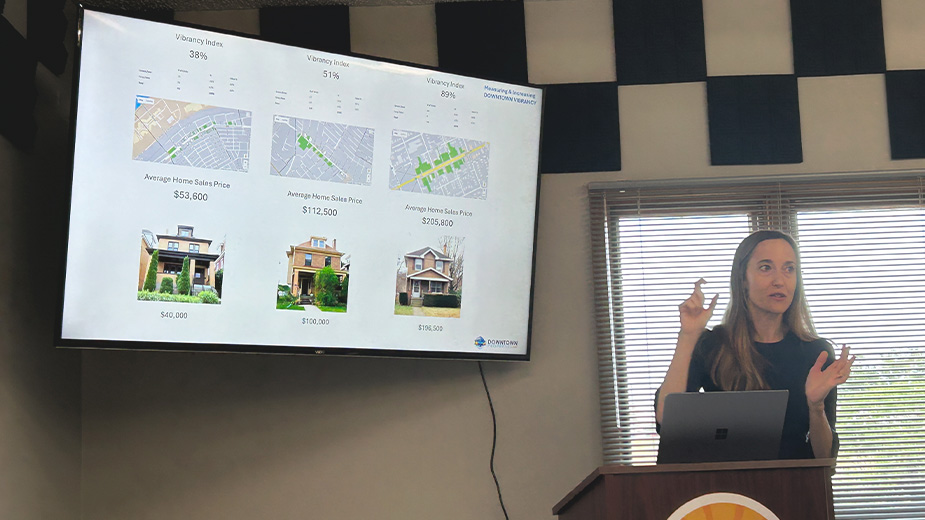Warren Ready for 1st Step in Demolishing Old St. Joseph Hospital
WARREN, Ohio – The city of Warren is ready to take the first step toward demolishing one of its oldest and most recognized blighted properties: the former St. Joseph Riverside Hospital.
On Thursday, officials announced that city council will take up legislation authorizing the application for a $2.5 million asbestos abatement grant from the state. If all goes as planned, the site will be torn down and converted into a greenspace within two years.
“This is the most important piece of legislation we’ve been able to undertake since the building closed in 1995,” Mayor Doug Franklin said on the steps of City Hall.
The legislation will be taken up by city council at its meeting next Wednesday. If approved, the final piece of paperwork for the application will be sent to the Ohio Development Services Agency.
“All the application parts that have been done are now with the state,” said Michael Keys, the city’s community development manager. “The only thing left is the authorizing ordinance. They want council to say, ‘We’re OK with making the application and accepting the funds.’”
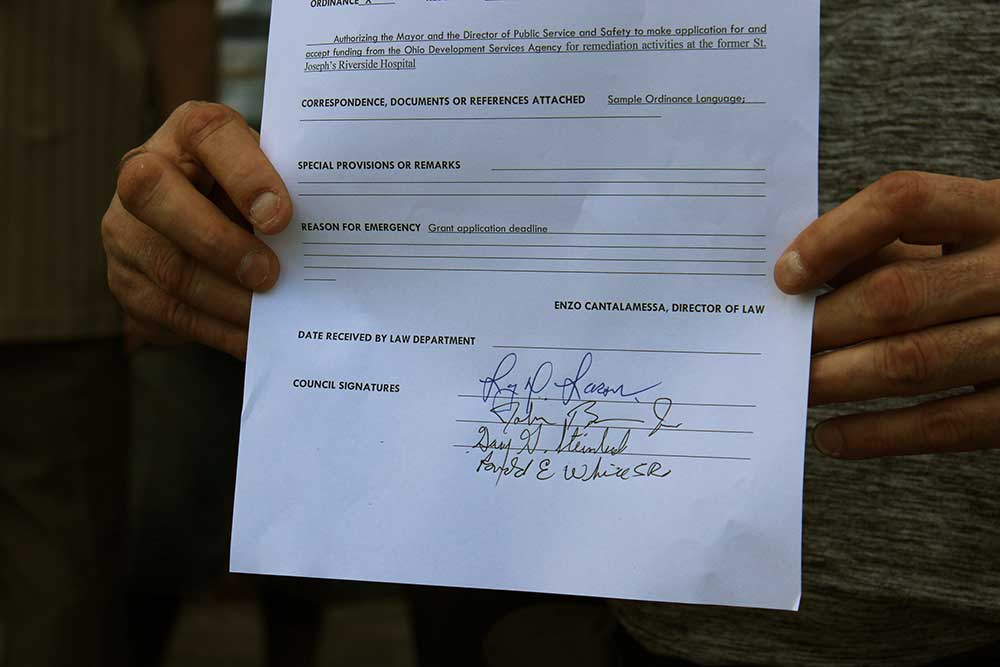
Franklin took office in 2012, the same year the former hospital was condemned, and the mayor is aware of that connection to his administration.
“Right away, this became a top priority for my administration and we’ve been working diligently ever since. We didn’t just sit on our hands after it was condemned to mitigate it as a public health risk,” he said.
In 2015, the Trumbull County Brownfield Coalition used grant money to fund an assessment of the site, along with the second phase of the study that was completed in February. With the assessment done, the city is ready for this newest step.
“No one really knew it about it because it’s not one of those sexy development things. It was just a study,” Franklin said “No one really cares about that, but it’s still important because we don’t have to spend that cost today.”
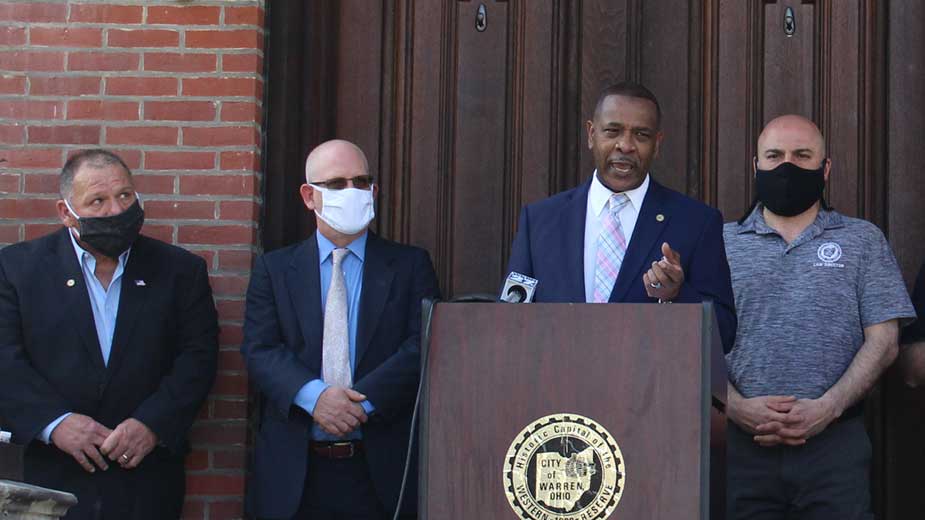
Keys said city officials expect to have “at least a draft” of the grant agreement from the state by May and to have the money before the end of the state’s fiscal year on July 1. At that time, the city will engage an environmental consultant and put the abatement work out to bid. Abatement will likely begin in the fall, followed by demolition next year.
The state is giving Warren two years to use the grant funds “ but if we move quickly and judiciously, it’ll be less time than that,” Keys said.
In many cases, asbestos abatement is the most expensive part of demolishing old, blighted properties. Having free money from the state to handle its mitigation in a 271,00-square-foot building greatly reduces the city’s burden. In total, the demolition work is expected to cost around $5 million.
“The problem has been, in any demolition we do, the requirement of an asbestos evaluation. If it’s present, we have to get rid of it,” Keys said. “That’s been the problem with the hospital all these years. Even though we might have been able to scrounge up the money to tear it down, it’s about $2.5 million to do the asbestos abatement. … Without the state’s assistance, it’d be another 10 years before we could deal with this.”
Another 10 years of St. Joseph Riverside Hospital sitting empty is something no one in the community wanted to see. Surrounding the site are a Mercy Health minor emergency center, the Someplace Safe domestic violence shelter, Safe Harbor Recovery, an apartment complex, homes and, across the Mahoning River, Packard Park. In the past, nearby residents have reported foul smells from the building in the summer and the building is covered in graffiti. Virtually all of the windows have been shattered out.
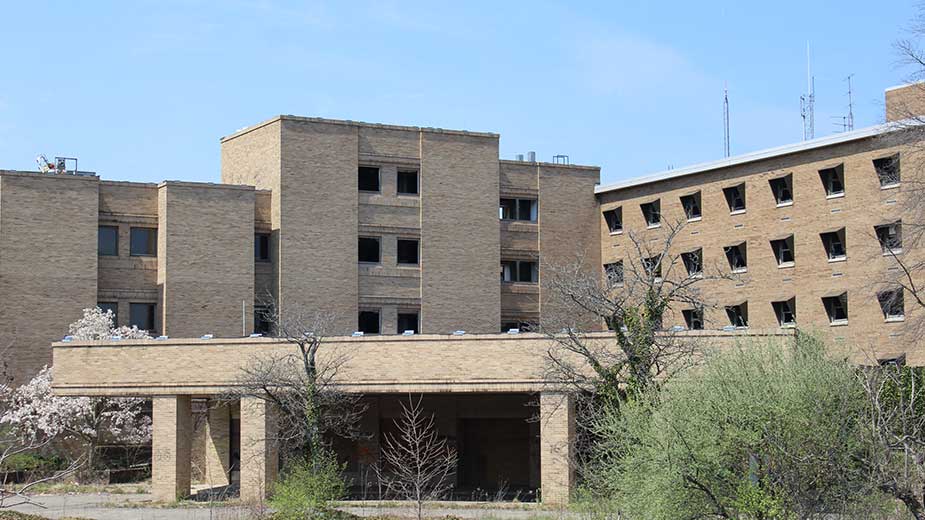
“For any businesspeople or people looking to live here, these kinds of eyesores and blight turn people away. It’s important to show that we, as a city, are progressive and aggressive in cleaning up our city,” Keys said. “The neighborhood around it has seen major drops in property values because of the site. Any time you do a brownfield assessment, studies show that the property values start going back up. … This is one of the best things the city could do to show we’re all about attracting people to this city.”
Built in 1934, the hospital complex eventually grew to encompass 12 buildings across 15 acres. There are plenty of fond memories of the hospital before it closed in 1996. Franklin recalls going there the first time he broke his arm as a kid. First Ward Councilman Larry Larson used to be able to see the bustle in and out of the hospital from his front window.
“When they expanded, my house was there right in the middle of the expansion. It got moved and I bought it afterward. I love this neighborhood and I’m looking forward to looking out my front window and seeing another shining building. It’s not a green field yet, but this is the first step,” Larson said. “It’s one abandoned building that needs to be taken down for the whole city. This is an example that we can do it.”
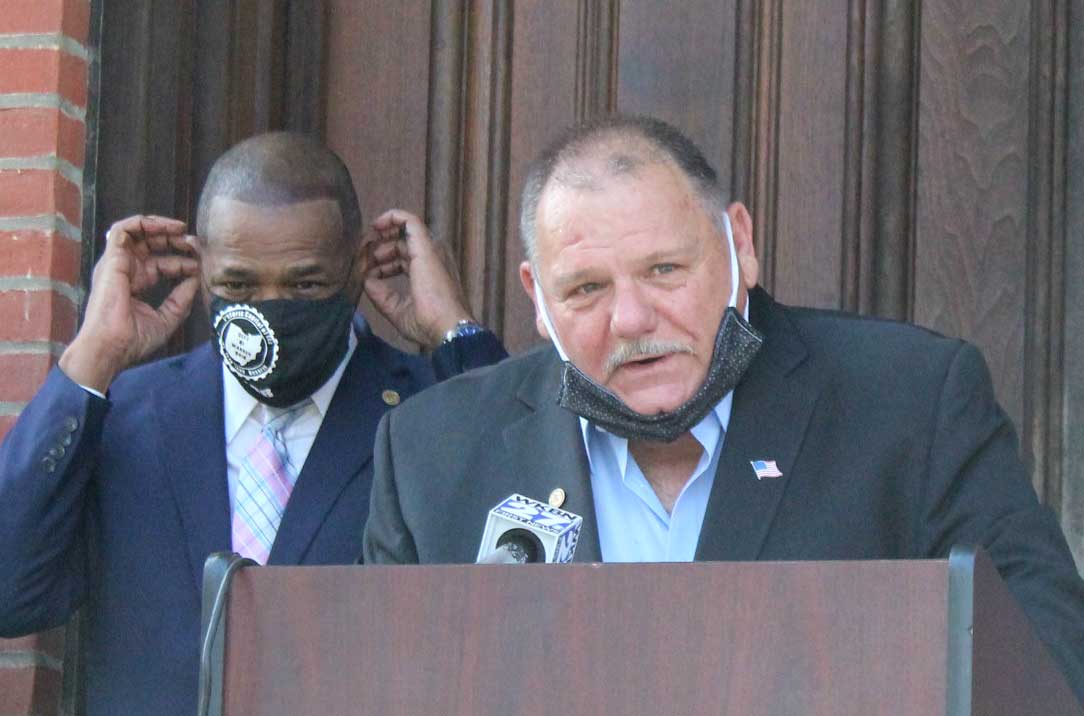
The hospital was closed in 1996 after Mercy Health – then named Humility of Mary Health Partners – acquired Warren General Hospital on Eastland Avenue. The site was then sold several times in quick succession with no owners implementing any of their proposed plans for the site. In 2015, foreclosure proceedings were initiated against the building’s owner at the time and, in 2019, the state took possession of the property.
“As a partner in health for the city of Warren, Mercy Health is excited to see a plan in place for the removal of the former St. Joseph Riverside Hospital,” a Mercy Health spokesman said in a statement. “Since being purchased from the ministry more than 20 years ago, several of the property’s new owners failed to develop the property. We applaud the city and each of the community organizations that continue to work towards building a healthier community.”
Last week, Franklin said, the state transferred the property to the Trumbull County Land Bank.
“It means a lot from the potential of new investment there. Those residents don’t have to ride by an empty hospital and see that old relic of the past,” the mayor said. “It’s driving down property prices and everything else, so we’re very happy to not just mitigate, but eliminate this cancer from the Northwest Side.”
Once the building is demolished, Franklin said the city has “a blank canvas to re-envision the site.” It’s most likely use will be a greenspace, with potential amenities including park benches, a boat launch and ambient lighting. But, he is sure to point out, nothing is set in stone yet.
“Nothing starts without getting the building down,” Franklin said. “I want to make sure we’re listening to residents of that neighborhood, residents of the city of Warren and councilmembers when we’re getting input on the long-term plans.”
Since most of the surrounding neighborhood is residential, it’s unlikely there will be any commercial development at the site. There has been interest in developing new housing at the site.
“We don’t rule out any development when it creates jobs and opportunity, but we don’t want to put anything that negatively affects that neighborhood that’s suffered for so long [if that business] backs out,” Franklin said. “I say with full confidence that there’s interest in residential development once the site is clean. That’s a conversation we’ll have as well.”
Copyright 2024 The Business Journal, Youngstown, Ohio.

